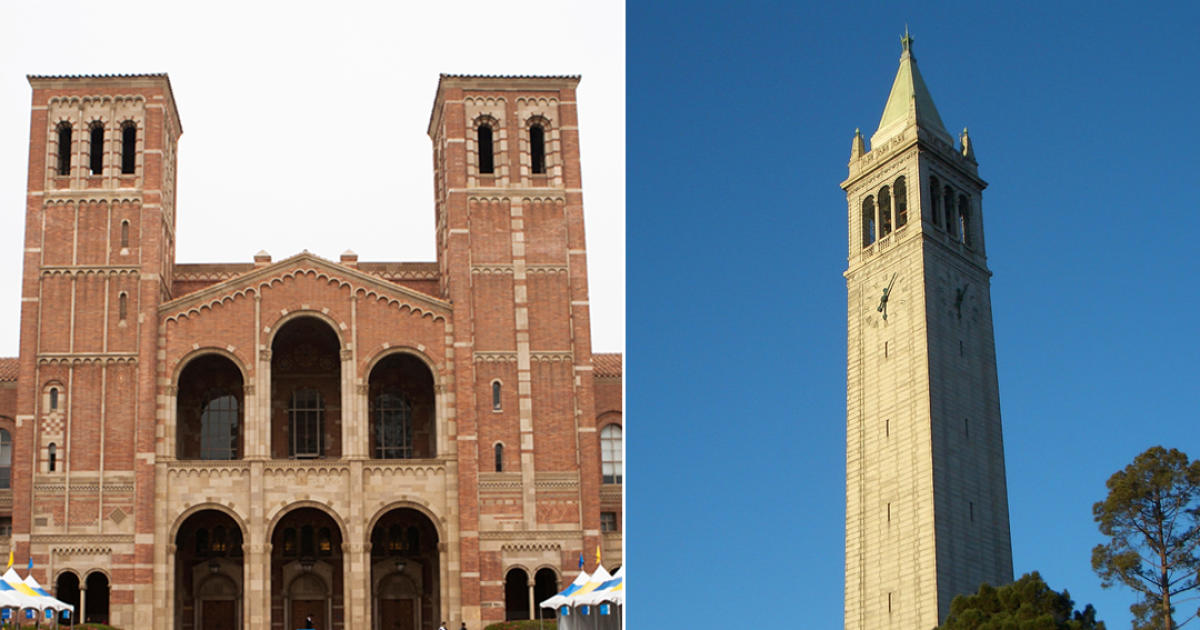Cal Reinstates Rugby & 2 Other Sports, Still Cuts Baseball
BERKELEY (KCBS / AP / BCN) -- The University of California reinstated three teams slated to be eliminated in a cost-cutting move but will go ahead with plans to get rid of the baseball and men's gymnastics teams.
KCBS' Mark Seelig Reports:
The school announced its decision on Friday to preserve the men's rugby, women's lacrosse and women's gymnastics teams. The two women's teams had been slated for elimination in September, while men's rugby was going to be reclassified as a "varsity club sport."
Campus officials said they received between $12 million and $13 million in pledges from group "Save Cal Sports" to retain the programs. They believed $8 million would be available for the three sports that were retained. That will cover their costs for seven to 10 years.
"We're three-fifths of the way there and we're not going to stop," said former Cal and major league pitcher Doug Nickle, who was involved with the fundraising efforts for "Save Cal Sports." "We're heartened and also emboldened. We're energized. We take our licks and we'll keep coming back."
Vice Chancellor Frank Yeary said pledges for baseball and men's gymnastics were insufficient.
He said the baseball program raised between $1.5 million and $2.5 million, which would have covered its costs for about two years. He said the supporters needed to come up with $10 million to achieve the goal of self-sustainability for the seven-to-10 year period.
"We're very impressed with the way the community has rallied," Yeary said. "The challenge for baseball is it is a larger sport in terms of costs. As a practical manner, they would have had to raise four, five or six times as much money as they raised to remain in position to be maintained. From the very beginning we said we simply could not agree to short term or stopgap measures. We needed a sustainable solution."
Cal won't field baseball or men's gymnastics teams in the 2011-2012 academic year but if enough money is raised the university would consider reinstating them in the future.
"Students and staff associated with these teams must now be allowed to move forward to make other plans," said Chancellor Robert Birgeneau, such as transferring to other universities if they want to continue with those sports.
Nickle disputed the university's numbers, saying his group raised $15 million and that the money the school is turning away would be more than sufficient to put baseball and men's gymnastics on firm footing.
He said officials never gave the baseball program the $10 million figure but believed that target could have been reached if it was made clear. He said that his group would still work to reinstate the two programs.
"We know the university has now made two wrong decisions," Nickle said. "The University of California deserves better. We will continue to work to provide better."
The plan to cut the sports was part of a broader campaign to reduce UC Berkeley's annual support for intercollegiate athletics from more than $12 million currently to about $5 million in 2014.
That became even more necessary after California Gov. Jerry Brown recently proposed an additional $500 million in cuts from the UC system budget, which would have taken about $80 million from the Berkeley campus.
"This was always about our ability to fund the programs," athletic director Sandy Barbour said. "This was about getting our expenses down to the point where we have a financial model that would fit with what the university was providing us in terms of institutional support."
Birgeneau said he did not believe the announcement in September was premature, even though three of the programs were eventually retained.
He said he sent a message to athletic department supporters 16 months ago that these cuts might be necessary and little was done to retain them until the announcement was made.
"My message engendered virtually no response for an entire year," he said. "The responses only came after the announcement of the cutting of sports. These sports had a full year to raise funds. But until the actual reality of no longer continuing the varsity sports was on the table, it was not until then that we got this wonderful response that we got now."
Although some UC Berkeley alumni had threatened to cut back on their donations if the university cut baseball, Birgeneau said he didn't think that would happen.
"I've been in close contact with our major supporters and they remain deeply loyal to Cal and without exception they have confirmed their continued support for the university," Birgeneau said.
A group of alumni at Stanford, which is UC Berkeley's biggest rival, raised nearly $50,000 to help save the sports that were targeted for elimination.
Pete McCloskey, a former congressman who played on Stanford's baseball team in 1947 and 1948, said that he was disappointed that Cal was dropping baseball because Stanford would be losing a major adversary.
McCloskey said, "Cal was very good in baseball in our day and this is going to hurt Cal."
Referring to Birgeneau, McCloskey said, "Maybe the chancellor doesn't understand that baseball is still the major American sport."
He said he would contact his fellow Stanford alumni to see if they would still follow through on their pledges even though Cal was eliminating baseball.
McCloskey said he thinks that if Cal had kept its baseball team, the Stanford alumni would have been able to raise substantially more than the $50,000 that had already been pledged.
The decision to retain the two women's programs keeps Cal in compliance with Title IX under the provision that it was meeting the "interests and abilities" of its female student body.
Had the women's sports been eliminated, Cal would have been in violation of that prong and would have needed to make the percentage of female athletes proportionate to the overall female enrollment. To achieve that, the school would have had to undergo "roster management"—a process that would have required the remaining men's teams to reduce their rosters by dozens of athletes, while substantially increasing spots on the remaining women's teams.
Part of the money to fund the two women's sports comes from donors to the rugby program, which needed the women's teams to remain in order for the school to remain in compliance with Title IX if it reinstated rugby.
"Our donors have once again generously demonstrated their high regard for Cal rugby through their impassioned response to these financial challenges," coach Jack Clark said.
The decision to cut baseball leaves the flagship campus of the University of California as the only Division I school in the state not to field a baseball team.
Cal has won the College World Series in 1947 and 1957 and had nine players appear in the major leagues last season. Perhaps the most notable player in its history is 2000 NL MVP Jeff Kent.
The Golden Bears, who open their season next week, are ranked 17th in the Baseball America preseason poll and are hopeful of making the NCAA tournament for the third time in four years.
Cal will honor the existing scholarships for the baseball and men's gymnastics athletes, although many have already started to look at transfer options.
(© 2011 CBS Broadcasting Inc. All Rights Reserved. This material may not be published, broadcast, rewritten, or redistributed.)



